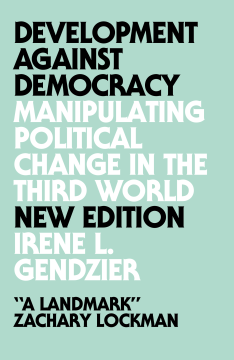
Additional Information
Book Details
Abstract
This new, updated edition of the influential Development Against Democracy is a critical guide to postwar studies of modernisation and development. In the mid-twentieth century, models of development studies were products of postwar American policy. They focused on newly independent states in the Global South, aiming to assure their pro-Western orientation by promoting economic growth, political reform and liberal democracy. However, this prevented real democracy and radical change.
Today, projects of democracy have evolved in a radically different political environment that seems to have little in common with the postwar period. Development Against Democracy, however, testifies to a revealing continuity in foreign policy, including in justifications of 'humanitarian intervention' that echo those of counterinsurgency decades earlier in Latin America, the Middle East and Southeast Asia.
Irene L. Gendzier argues that the fundamental ideas on which theories of modernisation and development rest have been resurrected in contemporary policy and its theories, representing the continuity of postwar US foreign policy in a world permanently altered by globalisation and its multiple discontents, the proliferation of 'failed states,' the unprecedented exodus of refugees, and Washington's declaration of a permanent war against terrorism.
'A landmark book'
Zachary Lockman
'Pathbreaking ... a major contribution'
Marilyn B. Young
Table of Contents
| Section Title | Page | Action | Price |
|---|---|---|---|
| Cover | Cover | ||
| Contents | v | ||
| Acknowledgements | vi | ||
| Foreword by Thomas Ferguson | vii | ||
| Introduction by Robert Vitalis | ix | ||
| 1. The \"New Look\" in Development Studies | 1 | ||
| 2. Making Connections | 14 | ||
| 3. Discourse on Development | 32 | ||
| 4. Transparent Boundaries: From Policies to Studies of Political Development | 54 | ||
| 5. Defining the Parameters of Discourse | 80 | ||
| 6. The Academic Translation: Liberal Democratic Theory and Interpretations of Political Development | 105 | ||
| 7. The Impossible Task of Theories of Political Development | 144 | ||
| Epilogue | 180 | ||
| Notes | 182 | ||
| Index | 213 |
